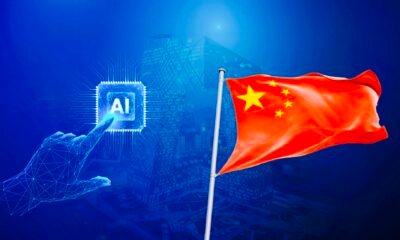Tools & Platforms
Lets Protect Public Good Over Tech Profits

A long time ago, kings owned all the land, while serfs worked that land without owning anything. Back then, if a serf had said, “Hey, I think this little plot of land where I built my house and farm my crops should belong to me,” he would have been laughed at.
“Oh yeah, how’s that going to work?” the king would have asked. “Is every one of you going to own your own little plot of land? Will you little people be able to buy and sell land to one another? How are you going to keep track of who owns what? Obviously, none of this is doable.”
In today’s increasingly digital world, data is becoming as valuable as land. And the lords of Silicon Valley don’t want us owning our data any more than the old kings wanted serfs owning their land.
Last week at the questionably titled “Winning the AI Race Summit” in Washington, D.C., President Donald J. Trump was talking about whether big tech companies should have to share the wealth with all the people whose skill, talent and labor contribute to the value of their extremely lucrative AI products.
“You just can’t do it,” said Mr. Trump, “because it’s not doable.”
I consider myself an extremely lucky artist. I’ve gotten to be a part of some incredible creative projects, but what I actually feel luckiest about is the people I’ve gotten to collaborate with. Making things together with my fellow passionate artists — whether “professional” or “unestablished” and whether “above the line” or “below” — is truly one of the great joys in my life. So you might assume I’d hate the very idea of using technology to do creative things that in the past could only be done “manually” by humans. But this isn’t the case. I don’t have a problem with AI as a technology; I think some of the new creative tools are inspiring. However, I believe we all have an urgent problem with today’s big AI companies’ unethical business practices.
The truth is that today’s GenAI couldn’t generate anything at all without its “training data” — the writing, photos, videos and other human-made things whose digital 1s and 0s get algorithmically crunched up and spit out as new. For more than half a decade now, AI companies have been scraping up massive amounts of this content without asking permission and without offering compensation to the people whose creations are so indispensable to this new technology.
Silicon Valley’s justification for what I believe is a clear case of theft — which Mr. Trump echoed — is that a Large Language Model (LLM) is no different from a person who, for example, reads a book and takes inspiration from it. But this comparison is not only inaccurate, it’s dystopian and anti-human. These tech products are not people. And our laws should not be protecting their algorithmic data-crunching the way we protect human ingenuity and hard work.
Enter Republican Sen. Josh Hawley and Democratic Sen. Richard Blumenthal (to thunderous applause) who introduced The AI Accountability and Personal Data Protection Act just last week as well. This new legislation would bar AI companies from training on copyrighted works, and allow people to sue for use of their personal data or copyrighted works without consent. In stark contrast to Mr. Trump’s Silicon Valley bootlicking summit, these two lawmakers from both sides of the aisle are standing up for working Americans against the giants of the tech industry. We should all hope their bill passes.
There are also glimmers of hope coming from the judiciary. In contrast to Mr. Trump’s comments, the White House’s official AI Action Plan doesn’t address the question of training data and intellectual property, and administration officials said it should be left up to the courts. Now, a few weeks ago, Mark Zuckerberg’s Meta declared victory on the issue, when a federal court ruled against a group of authors who had sued for violation of their copyright. But in fact, the judge of that case said the authors probably only lost because their lawyers made the wrong argument about the legal framework of fair use.
In his ruling, Judge Vince Chhabria wrote: “No matter how transformative LLM training may be, it’s hard to imagine that it can be fair use to use copyrighted books to develop a tool to make billions or trillions of dollars while enabling the creation of a potentially endless stream of competing works that could significantly harm the market for those books.” So, if I were Zuck, I wouldn’t be celebrating too hard yet. There are plenty more lawsuits against AI companies still pending — including a recent first from major Hollywood studios — and I can only imagine the next set of plaintiffs will heed Judge Chhabria’s advice to focus on market harm.
But, what if none of this works? What if AI companies are just allowed to keep going with this unethical practice? Of course no one can predict the future, but it only stands to reason that this would eventually spell the end of any other commercial content business. Film and television, for sure. Professional journalism, as well. The new and vibrant creator economy of today’s YouTubers, podcasters, newsletter writers, all gone. I’m not saying people won’t make stuff anymore; I’m just saying they won’t be able to earn a living with what they’ve made. Because as long as an AI company can copy all of our content into their model at no cost and spit out quasi-new content for close to no cost, there’s no logical business case for paying human creators anymore.
Don’t get me wrong — I do believe it’s possible that this new technology could propel a great leap forward in human creativity. But only if there’s a system in place that rewards people for their novel creative work as it’s incorporated into the AI models. Without such a system, and with no economic incentive for people to be creative, our media landscape and public square will become absolutely devoid of anything but algorithmically regurgitated slop optimized for attention maximization and ad revenue.
As concerned as an artist like myself may be with the future of art and creativity, this issue actually reaches far beyond the media industry. It’s also about ordinary people’s everyday struggle just to make ends meet.
We creators might be some of the first to feel the threat, but anyone who does their work on a computer is in the same crosshairs: people who work in marketing, or logistics, or finance, or design, just to name a few. And while white-collar jobs will be impacted earlier, blue-collar jobs will follow soon enough, especially as autonomous vehicles and robotics come into further use. Employment as a plumber is considered safe for now, but perhaps not for our kids’ generation. And how will an autonomous plumber-bot know how to do its job? The AI powering it would be trained on data that came from millions of human plumbers doing their jobs. Wouldn’t those humans deserve some compensation? Not if Silicon Valley gets its way. The decisions we make today really could commit us to a future where any valuable work done by any human being will become fair game for a tech company to hoover up into its AI model and monetize, while that human being gets nothing.
People feel this coming. In fact, in a recent poll, 77 percent of Americans said they’d rather get AI right than get it first. Of course, this sentiment is bad for business, so Big Tech responds by sounding the national security alarm. Mr. Trump echoed this common Silicon Valley refrain last week, warning that American AI companies must be allowed to continue to steal everyone’s data or else we’ll lose to China. Why do you think the summit was titled “Winning the AI Race”? Who’s going to argue with a matter of national security?
But let’s be real. These AI businesses have no loyalty to the American people. Their only obligation is to their shareholders. Plus, if our national security would really be compromised if AI companies had to compensate people for their data, then theoretically, shouldn’t the government be willing to make up the difference? I was just corresponding with a D.C. lawyer about this, and he brought up the “Takings Clause” of our Fifth Amendment: “… nor shall private property be taken for public use, without just compensation.” To me, it still seems like the tech companies should pony up, not the government. But I think it goes to show that all this urgency to “beat China” is not really a matter of national security. It’s just competitive businessmen wanting to beat their competitors. Cash, as one great American poet said, rules everything around me.
I didn’t vote for President Trump, but I think most of the people who did vote for him genuinely believed he would stand up against a powerful establishment and fight for working Americans. But there is no establishment more powerful in the world today than the handful of gigantic businesses building and selling AI, and none posing a greater threat to the American people’s widespread prosperity. If Mr. Trump really wanted to fight for working Americans, he would join Senators Hawley and Blumenthal in building out policy to protect the public good over Silicon Valley’s bottom line. It’s what he was elected to do. And it is, in fact, doable.
Joseph Gordon-Levitt is an actor, filmmaker, and founder of the online community HITRECORD. He recently started publishing “Joe’s Journal” on Substack and is set to direct an upcoming thriller about AI for Rian Johnson and Ram Bergman’s T-Street.
Tools & Platforms
Your browser is not supported
azcentral.com wants to ensure the best experience for all of our readers, so we built our site to take advantage of the latest technology, making it faster and easier to use.
Unfortunately, your browser is not supported. Please download one of these browsers for the best experience on azcentral.com
Tools & Platforms
Maritime Networks Show Boards How To Navigate AI Governance

From Sails to Servers
Solange Charas, PhD, HCMoneyball
When boards grapple with AI governance today, they often feel they’re navigating uncharted waters. But we’ve sailed these seas before. Five centuries ago, maritime networks created the world’s first global information superhighway, transforming how value was created, managed, and measured. The governance lessons from that era offer a strategic blueprint for today’s C-suite leaders managing AI transformation. As Forbes has noted, boards must navigate AI governance in an uncertain regulatory environment, making historical precedents increasingly valuable.
Between 1400 and 1700, maritime innovations didn’t just change transportation—they fundamentally reshaped business models, workforce development, and financial systems. The parallels to today’s AI revolution are striking, and the governance implications are clear: organizations that treat AI as merely a technology deployment will miss the strategic transformation it demands.
The Original Platform Economy: Governance Lessons from Maritime Networks
Modern boards often view AI through the lens of operational efficiency. History suggests this misses the point entirely. The Dutch East India Company (VOC), founded in 1602, understood that maritime technology wasn’t just about better ships—it was about creating entirely new organizational structures.
The VOC pioneered what we’d now recognize as platform governance: standardized global processes, the world’s first modern stock exchange for capital formation, complex multi-continental logistics networks, and hybrid workforce models that mixed employees with contractors. Most importantly, they created compensation structures that aligned individual performance with enterprise returns—paying workers modest wages plus profit shares.
This wasn’t just innovative management; it was strategic governance that recognized foundational technology requires fundamental changes to how organizations create and capture value. Today’s boards face an identical challenge with AI.
Human Capital as Strategic Asset: Then and Now
The maritime revolution created entirely new professional categories that hadn’t existed before: navigators who mastered complex mathematical calculations, cartographers who combined technical precision with creative insight, and insurance underwriters who developed sophisticated risk assessment capabilities.
Traditional roles didn’t disappear—they evolved. Local traders expanded their capabilities to operate globally. Ship captains transitioned from operational roles to complex management positions overseeing intercontinental operations. Craftsmen upskilled to work with new materials and production methods.
The key insight for today’s CHROs and CFOs: successful maritime powers invested systematically in workforce transformation. Spain’s Casa de Contratación created standardized navigator certification programs—perhaps history’s first technical bootcamp. Maritime academies proliferated across Europe, teaching navigation, cartography, and global commerce.
This systematic approach to skills development wasn’t a cost center—it was a strategic investment that enabled competitive advantage. The same principle applies to AI transformation today. As Forbes has highlighted, human capital is the ultimate differentiator in technological transformations.
Financial Governance: Measuring Maritime ROI vs. AI ROI
The governance challenge boards face with AI mirrors what maritime-era leaders confronted: how do you measure returns on transformational technology?
Historical data reveals striking patterns:
- Trade volumes increased tenfold between 1400-1700
- Spice prices in European markets dropped 70% due to transportation efficiency
- Port cities like Amsterdam experienced 400% population growth
- Specialist navigators earned wage premiums of 3-4x typical artisan compensation
Today’s AI metrics show remarkably similar patterns:
- McKinsey reports AI can drive 23% average productivity improvements
- AI specialists command 35-50% wage premiums above traditional technical roles
- Organizations implementing AI systematically see measurable improvements in operational efficiency and revenue growth
The critical governance lesson: early adopters rarely dominate technological revolutions. Systematic adapters do. AI implementation success comes from systematic approaches, not speed. The Portuguese developed superior maritime technology first, but the Dutch built superior organizational systems around that technology and ultimately dominated global trade. AI implementation success comes from systematic approaches not speed!
Three Governance Imperatives for AI Leadership
Maritime history reveals three essential governance principles that apply directly to AI transformation:
1. Ecosystem Investment Over Technology Investment
Maritime success required more than better ships. It demanded navigation schools, financing mechanisms, legal frameworks, and insurance markets. Similarly, successful AI implementation requires governance ecosystems: training programs, ethical frameworks, data infrastructure, and risk management protocols.
Boards must ask: Are we building AI capability or AI ecosystems? The former leads to pilot projects that don’t scale. The latter creates sustainable competitive advantage.
2. Balanced Risk Management
Thriving maritime nations balanced protection of existing industries with incentives for innovation. England’s Navigation Acts protected domestic shipping while encouraging new ventures. Dutch financial innovations managed risk while enabling new business models.
Today’s boards need similar balanced approaches to AI policy. This means establishing governance frameworks that both protect against algorithmic bias and legal exposure while enabling workforce augmentation and operational innovation.
3. Systematic Human Capital Development
The most successful maritime powers created formal institutions for skills development. They recognized that technological advantage comes from human capability, not just technical capability.
CHROs and boards must treat AI literacy as a strategic imperative, not a training afterthought. This means creating systematic development programs, tracking human capital ROI alongside AI ROI, and ensuring that workforce transformation supports rather than undermines organizational resilience.
Measuring What Matters: Human Capital ROI in the AI Era
The SEC’s enhanced human capital disclosure requirements under Reg S-K Item 101(c) reflect growing recognition that workforce strategy is material to enterprise value. Maritime-era governance offers a template: track both technological adoption and human adaptation with equal rigor.
Key metrics should include:
- AI-human collaboration effectiveness, not just automation rates
- Internal mobility and reskilling success rates
- Innovation pipeline strength as AI augments human creativity
- Employee engagement and retention during technological transition
These aren’t “soft” HR metrics—they’re predictive indicators of sustainable competitive advantage.
The Governance Imperative: Leadership in Transformation
History’s lesson is unambiguous: technological revolutions reward systematic adapters, not early adopters. The Portuguese pioneered maritime technology but the Dutch mastered maritime governance.
For today’s boards, this means treating AI not as an IT project but as a governance challenge that spans strategy, finance, and human capital. Success requires CHROs and CFOs working in concert to ensure AI enhances rather than erodes organizational capability.
The organizations that emerge stronger from AI transformation will be those that remember what maritime history teaches: technology alone never changes the world. People, institutions, and governance do.
Author Note: This column builds on collaborative research with Stela Lupushor examining historical patterns in technological transformation and their implications for modern workforce strategy.
Tools & Platforms
Your browser is not supported
northjersey.com wants to ensure the best experience for all of our readers, so we built our site to take advantage of the latest technology, making it faster and easier to use.
Unfortunately, your browser is not supported. Please download one of these browsers for the best experience on northjersey.com
-
Tools & Platforms3 weeks ago
Building Trust in Military AI Starts with Opening the Black Box – War on the Rocks
-

 Business2 days ago
Business2 days agoThe Guardian view on Trump and the Fed: independence is no substitute for accountability | Editorial
-

 Ethics & Policy1 month ago
Ethics & Policy1 month agoSDAIA Supports Saudi Arabia’s Leadership in Shaping Global AI Ethics, Policy, and Research – وكالة الأنباء السعودية
-

 Events & Conferences3 months ago
Events & Conferences3 months agoJourney to 1000 models: Scaling Instagram’s recommendation system
-

 Jobs & Careers2 months ago
Jobs & Careers2 months agoMumbai-based Perplexity Alternative Has 60k+ Users Without Funding
-

 Funding & Business2 months ago
Funding & Business2 months agoKayak and Expedia race to build AI travel agents that turn social posts into itineraries
-

 Education2 months ago
Education2 months agoVEX Robotics launches AI-powered classroom robotics system
-

 Podcasts & Talks2 months ago
Podcasts & Talks2 months agoHappy 4th of July! 🎆 Made with Veo 3 in Gemini
-

 Podcasts & Talks2 months ago
Podcasts & Talks2 months agoOpenAI 🤝 @teamganassi
-

 Mergers & Acquisitions2 months ago
Mergers & Acquisitions2 months agoDonald Trump suggests US government review subsidies to Elon Musk’s companies





















